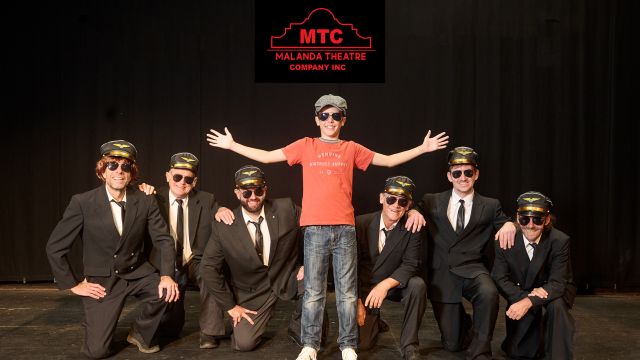The Full Monty
It is 1980s industrial Sheffield, England. The steelworks have closed and men are out of work. This bleak setting provides the backdrop to The Full Monty, a play that captures the times and behaviour of the people who lived through it all.
Though the original steelworks were hell on earth to work in, the men in the play are angry, frustrated and confused as to why they have lost their jobs. But desperate times call for desperate ideas and the one they come up with is to become male-strippers.
Encouraged by a packed working men’s club full of women enthusiastically cheering a troop of professional strippers, the men take on the challenge of emulating the professionals. Led by Gaz, brilliantly portrayed by Andy Bramble, the steelworkers long road to centre stage begins.
Assisted by Dave (Jake Skukan), Lomper (Peter Arnold-Knott), and Gaz’s young son Nathan (Luke Turner), Gaz holds auditions in a disused part of the steelworks. Successful in auditioning are Horse, hilariously played by Chris Davey, and Guy, smoothly performed by Tim Bryde. The final recruit to this ramshackle group is Gerald (Paul Bowater), a former manager at the steelworks and ballroom dance instructor, who is pretending to his wife that he is still fully employed.
The strip rehearsal scenes are comical, shambolic and complicated by the fact that each man is seriously questioning what the hell they are doing learning to strip off their clothes in what seems to be a hopeless cause.
The play is well supported by female cast members in Nakita Growden, as Dave’s long suffering wife, Buckley Watson as Gaz’s ex-wife, Geraldine Borella as Gerald’s free-spending garden gnome loving wife, and Anne Bowater and Louisa Crossle in various roles. Dale Heiner also gets involved in various roles as a failed male stripper, a policeman and a drag queen. Marky Baker also plays several roles, none better than the club compere before the big moment arrives when the lads finally get to strip off in an absolutely pulsating finale.
The Full Monty is not an easy production to achieve, especially with the many fast scene changes that are required. However, thanks to all the cast and crew, the Malanda Theatre Company, under the direction of Nicola Salisbury-Faulkner, has done it again.
Ken Cotterill
Subscribe to our E-Newsletter, buy our latest print edition or find a Performing Arts book at Book Nook.

